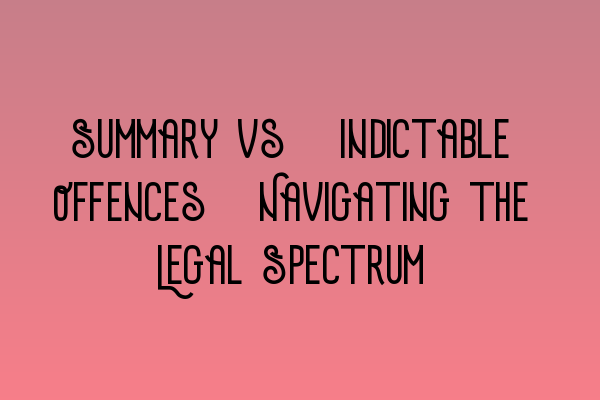Summary vs. Indictable Offences: Navigating the Legal Spectrum
Understanding the complexities of criminal law is paramount to anyone involved in legal practice. Whether it’s preparing for your SQE exams or working as a solicitor, having a solid grasp of the different types of offences is vital. Two common categories of offences that you will come across in your legal journey are summary offences and indictable offences.
Summary Offences
Summary offences, also known as minor criminal offences, are usually less serious in nature and are dealt with in the magistrates’ court. These offences include minor assaults, petty theft, public disorder, and traffic violations. They are typically tried and sentenced summarily, without the need for a jury trial. It’s important to note that summary offences carry a maximum penalty of six months’ imprisonment or less.
If you’re preparing for your SQE 1 Practice Exam Questions, it’s essential to have a thorough understanding of summary offences. Familiarizing yourself with the various elements, defences, and procedural aspects of summary offences will undoubtedly strengthen your criminal law knowledge.
Indictable Offences
Indictable offences, on the other hand, are more serious criminal offences that require a trial by jury. These offences include murder, rape, robbery, and drug trafficking. Due to their nature and potential for severe penalties, indictable offences are tried in the Crown Court. The trial process is more complex and involves a jury determining the guilt or innocence of the accused.
Unlike summary offences, indictable offences carry higher maximum penalties, often including lengthy prison sentences. The selection of the appropriate charges and preparation of a strong defence are essential factors in ensuring a fair trial for the accused.
For aspiring solicitors preparing for their SQE 1 Practice Mocks FLK1 FLK2, understanding the intricacies of indictable offences is crucial for success. Familiarize yourself with the elements, defences, and procedures associated with these offences to excel in your criminal law studies.
The Importance of Differentiating Summary and Indictable Offences
Knowing the distinction between summary offences and indictable offences is crucial for legal professionals. It determines the appropriate court where the case will be heard, the trial procedures to be followed, and the potential penalties that may be imposed. As a solicitor, having a thorough understanding of these distinctions enables you to provide accurate advice to your clients and effectively represent them in court.
If you’re looking for comprehensive SQE 2 Preparation Courses to broaden your knowledge of criminal law and practice, SQE Criminal Law & Practice Law UK offers tailored courses designed to equip you with the necessary skills and expertise.
Conclusion
Navigating the legal spectrum requires a solid understanding of both summary and indictable offences. As a legal professional, it’s essential to distinguish between the two categories, comprehend their respective procedures, and be well-versed in the potential penalties associated with each offence. By honing your knowledge and skills, you’ll be well-prepared to tackle the diverse challenges that come your way as you embark on a career in criminal law.
For more information about SQE exams and important dates, including SQE 1 Preparation Courses and SRA SQE Exam Dates, visit our website or contact us today.
